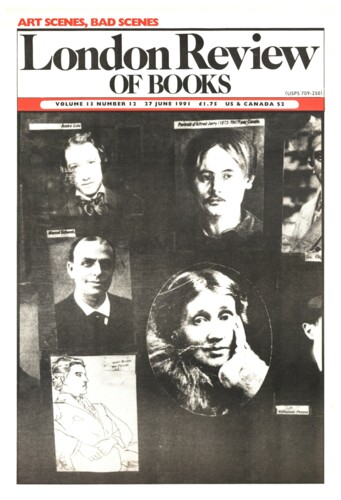In Michael Korda’s Curtain a thinly disguised Laurence Olivier puts at risk his marriage to a thinly disguised Vivien Leigh by having an affair with (stop me if you’ve heard this one) a no less thinly disguised Danny Kaye. Well!
Well? As a piece of writing, the novel is aimed with charming accuracy at the station bookstall trade, where it should thrive. It opens in a Hollywood where Vivien Leigh, ‘Felicia Lisle’, has won an Oscar, and subsequently grants her a Shakespearian stage career to match her paramour’s. The famous romance is then chronicled, featuring violent tiffs and passionate reconciliations, an Olivier wrestling honourably, baffled, with the lady’s unstable emotions and her helpless envy of his stage charisma, while she, though adoring him, remains faintly unsatisfied in bed (is he saving his best for the footlights?) and trysts with, among others, a masterful, incestuous uncle – himself a peer. A real one, that is – landed gentry. Celebrity buffs should be warned that there’s more soap than gossip in the book, whose melodramatic twists stray from veiled biography and restore Korda’s characters entirely to fiction.
Yet the tease, and presumably the book’s selling point, remains that fleeting (as Korda draws it) liaison between Olivier and Kaye, the unmistakable originals of ‘Robert Vane’ and ‘Randy Brooks’: and truth in it? And if there were? Do the recent revelations of Lawrence Durrell’s relations with his daughter alter our attitude to Durrell’s books? Our understanding of them? The revelations in question are substantial, by contrast with Korda’s roman à clef insinuation, and are so distressing that comparison may seem odious. But some of the same questions apply. Suppose Olivier had romped in private with the whole of London Zoo, would this be something we needed to know?
We’d love to know, of course. Though we surely accept that the art, the work, the well-spring of our interest in its mouthpiece, draws on instincts murkier and more devious – as well as more transcendent – than any coupling, more primitive than the incidents of an artist’s life. Here, in the polymorphous perversity of the imagination, is matter indeed for a description of the creative life. Korda gives us an affair, yet manages to under-explore the sexual diversity of Olivier’s appeal as an actor, the bristling camp of his performances.
This is the pity of the book. The wider questions still nag, however. It’s a short step to the moral high ground, to the argument that what a man does with his multiplicity, off the public stage, is blazingly irrelevant. What of biography, then? What of sheer curiosity? Shall we pass a law against it? If not, must we succumb to the squalid tabloid creed that public eminence vitiates privacy? Within legal limits, I take it we must. Celebrity gossip intrigues most of us as much as gossip about friends and neighbours, and of course we don’t have to listen, or read tabloid reports or biographies, just as you, hypocrite lecteur, have of course declined to read this review, given its subject.
Anaesthetic as it is, celebrity itself is not an entirely unworthy or uninteresting topic. Your reviewer (now that we’re gossiping, and why else do you think I am your reviewer today?) is a middle-aged writer with a decent record of work, by turns admired, ignored, dismissed, occasionally accoladed. But what remains of consuming interest to others is that he is a celebrity’s child. What was it like, what is it like, asks every interviewer, even though the occasion for the interview is my own work, not my parent’s. I sympathise; I can’t escape the knowledge that it would interest me no less, were I another. I try to answer.
I know, before the interviewer knows it, the pall of disappointment that attends whatever answer I give. Because the question is all. The answer is the very essence of bathos – as this book of Korda’s is to anyone seeking the flavour of celebrity, a careful, calculated book, faintly scandalous, obligingly fanciful, professional, and hollow. In and of itself, celebrity is a hollowing, a kind of sacred hollowing, as though the question that it begs – what is it, to be a king? – is itself an act of tribal worship, the answer to its own question.
Yes, but what is it? Celebrity, what is it like? Go and look in a mirror: that wishful, estranged blankness of gaze you’ve addressed to it, now returned to you – that’s celebrity.
Send Letters To:
The Editor
London Review of Books,
28 Little Russell Street
London, WC1A 2HN
letters@lrb.co.uk
Please include name, address, and a telephone number.

